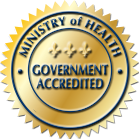Addiction affects millions of people each year, yet few seldom seek the help required to get sober and improve their long-term health and well-being. If you or a loved one has a problem with drugs or alcohol, are most likely here seeking information.
We have compiled some frequently asked questions and answers.
Can addiction be cured?
Alcoholism and addiction can be treated, although there is no 'cure'.
And while there is no specific cure, each residents uniquely designed program will provide them with the insight into the underlying reasons for using or drinking and will provide them with the tools to stay clean for the rest of their lives.
How does Detox fit in to treatment?
For some, detox is the first step toward rehabilitation. Detox is the process of eliminating the toxins completely from one's system. When detox is over, the physical addiction will be finished and the person can begin their rehabilitation program.
What should we expect from Detox?
Detox will produce a series of withdrawal symptoms. These symptoms are seldom life threatening but will cause the person to feel sick for a few days. The symptoms may withdrawal involve: headaches, vomiting, tremors, restlessness, perspiration, insomnia and loss of appetite. The more serious symptoms of detox can include Delirium Tremors and seizures.
How long will Detox take?
it will vary, as each person is different and so too will be the extent of their addiction, however, usually the detox process lasts between 3 days to 2 weeks to complete.
What happens after Detox?
One of the most important aspects addiction treatment is counselling, so once the physical reliance of the substance has been removed it is time to tackle the mental reasons and reliances.
When someone takes part in a treatment program, they will be involved through individual counselling as well as group counselling. Individual counselling involves private sessions with a treatment professional, this gives the resident the opportunity to learn about the root causes and discuss the behavioural changes needed to achieve and maintain sobriety. Group counselling sessions provide the resident with the opportunity to share openly about their addiction with a sympathetic group of their peers who are going through similar issues.
How long does rehab take?
Some treatment programs may promise a quick fix, but the ones that truly work last 30 days or more. This is considered to be the minimum time needed to let the rehab program to take hold. Some people decide to commit to longer treatment, sometimes for a year or more. The duration of your treatment program really depends on the severity of your addiction and your commitment to change
Inside a Recovery Center
Admitting yourself to addiction treatment at an addiction recovery center can be frightening. When someone is suffering from an addiction, no matter how unstable their life is because of it, the idea of entering into a new, unfamiliar place can be overwhelming. But in actuality, rehab centers are filled with supportive staff and a dedicated team of addiction professionals whose only motivation is help individuals to achieve sobriety and master the techniques and coping strategies to fight addictions.
Below you will find an outline of programs that are found in most addiction treatment and recovery centers.
Even though every rehab program is not the same, there are several key essentials that can be found at most, including:
When someone enters an recovery center, the first step is the admission process. This is more than an introduction meeting regarding the addict’s condition. This is also an opportunity to ask questions about the addiction treatment program and what to expect in the following days and when treatment is completed.
Group and individual one-on-one counseling constitute the most important elements of rehab. Individual counseling gives the resident in recovery an opportunity to meet privately with an addictions counsellor or psychotherapist the root causes behind their addiction. In group sessions, residents can gain support from peers in the program.
Many recovery centers integrate holistic care or alternative therapies into their core programs to enhance the therapeutic process. These programs usually include Eastern practices like acupuncture, meditation, spirituality and yoga.
Residential recovery centers also do whatever is possible to improve the overall health and well-being of the individual. A nutritionist can help teach residents the importance of eating healthier and re-learning eating habits that were distorted from the consequence of addiction. Diet can help with mood swings and increased energy levels that help the person stay focused on their recovery plan.
One of the most effective ways to speed up the recovery process is through proper exercise. With alcohol or drug addiction, a person neglects their own physical health and with regular exercise the body rebuilds itself and gains strength which can help stave off cravings and boost the feel good hormones-endorphins that increase a sense of well being which has been depleted through addiction and self-neglect. In addition, leisure activities help residents learn new ways to cope with boredom and stress that are associated with addiction and relapse through sports or regaining new hobbies lost through addiction or creating new ones like gardening, cooking, cinema and book clubs to name a few.
When a residential rehab program is completed, one will face a number of challenges. A viable aftercare program helps make the transition from structured residential rehab to the outside world easier for graduates. This can be anywhere from sober life, 12-step or other group meetings, weekly individual counselling to sober living and much more.
Sobriety.ca Foundation offers personalized and innovative treatment for people who suffer with addiction.
The expert and caring staff at Sobriety.ca Foundation know how to help people with addiction through this difficult time in their lives. The programs at Sobriety.ca Foundation provide the tools and counseling needed to regain control and re-enter the world sober. For more information on our rehab programs call us today at 1-888-999-8101.










